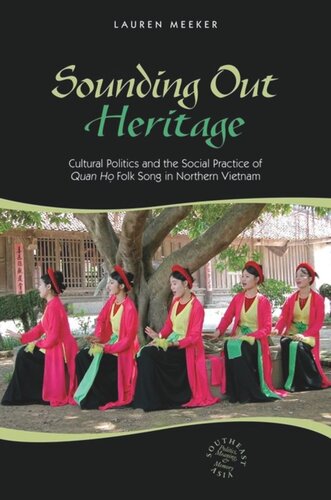

Most ebook files are in PDF format, so you can easily read them using various software such as Foxit Reader or directly on the Google Chrome browser.
Some ebook files are released by publishers in other formats such as .awz, .mobi, .epub, .fb2, etc. You may need to install specific software to read these formats on mobile/PC, such as Calibre.
Please read the tutorial at this link: https://ebookbell.com/faq
We offer FREE conversion to the popular formats you request; however, this may take some time. Therefore, right after payment, please email us, and we will try to provide the service as quickly as possible.
For some exceptional file formats or broken links (if any), please refrain from opening any disputes. Instead, email us first, and we will try to assist within a maximum of 6 hours.
EbookBell Team

4.7
16 reviewsSounding Out Heritage explores the cultural politics that have shaped the recent history and practice of a unique style of folk song that originated in Bắc Ninh province, northern Vietnam. The book delves into the rich and complicated history of quan họ, showing the changes it has undergone over the last sixty years as it moved from village practice onto the professional stage. Interweaving an examination of folk music, cultural nationalism, and cultural heritage with an in-depth ethnographic account of the changing social practice of quan ho folk song, author Lauren Meeker presents a vivid and historically contextualized picture of the quan họ “soundscape.” Village practitioners, ordinary people who love to sing quan họ, must now negotiate increased attention from those outside the village and their own designation as “living treasures.” Professional singers, with their different performance styles and representational practices, have been incorporated into the quan họ soundscape in an effort to highlight and popularize the culture of Bắc Ninh province in the national context.
With its focus on the politics of rescuing, preserving, and performing folk music, this book makes a timely contribution to studies of cultural politics by showing with considerable nuance how a tradition can become a self-conscious heritage and national icon. In 2009, Quan Họ Bắc Ninh Folk Songs was inscribed on UNESCO’s Representative List of the Intangible Cultural Heritage of Humanity. Defining and reframing quan họ as cultural heritage has further complicated the relationship between village and professional quan họ and raises crucial issues about who has the authority to speak for quan họ in the international context. Sounding Out Heritage offers an in-depth account of the impact of cultural politics on the lives and practices of quan họ folk singers in Vietnam and shows compellingly how a tradition can mean many things to many people.